Why is Power Bank Rental a Great Boost for Smart City Building?
As urbanization accelerates globally, cities are experiencing rapid population growth, leading to a host of social challenges. To address these issues efficiently, the smart city building has become an essential strategy for governments worldwide.
Building a smart city requires coordinated efforts across multiple sectors, including strengthening infrastructure, establishing big data platforms, ensuring security and privacy protection, creating smart transportation systems, integrating smart health and medical services, managing energy efficiently, monitoring the environment, promoting digital governance and citizen participation, and providing public services with social inclusivity, etc.
Power bank rental is perfectly positioned to support the development of smart cities, as it spans across various key areas. The government’s support for shared power bank initiatives is highly likely, which can make the power bank sharing business significantly easier to scale and more profitable. Therefore, starting a power bank rental business is a promising opportunity for those looking to generate income. You can have a try~
In recent years, to tackle the severe challenges posed by urbanization, such as energy shortages, environmental pollution, traffic congestion, and public safety issues, many countries and cities are turning to high-tech solutions to provide more efficient solutions and are actively working toward building smart cities. The construction of smart cities has already become an important trend in global urban development. This article will explore the smart city building and analyze the role of shared power banks in this context.
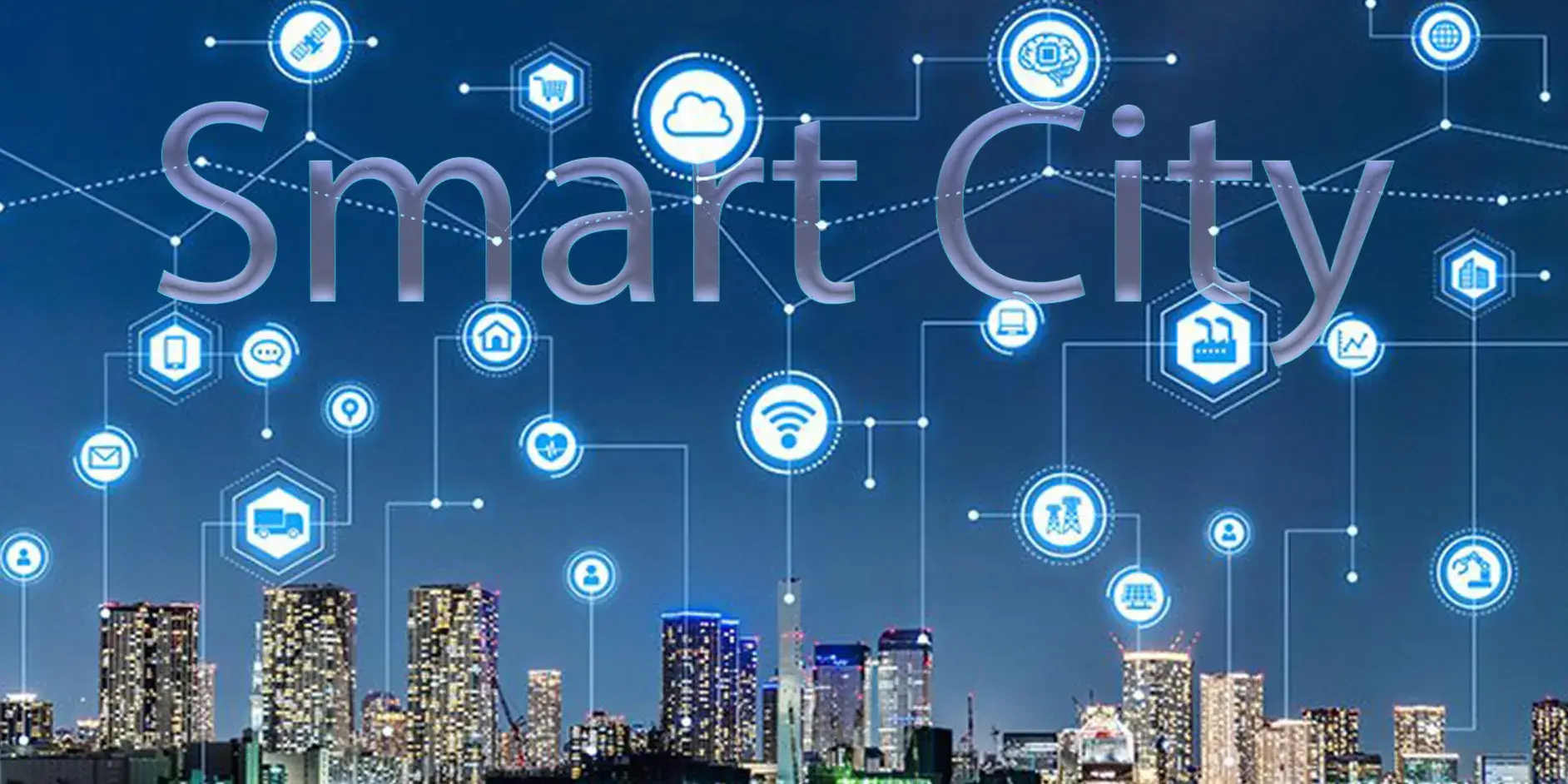
First, you can have a look at the follow table of contents to get known of the whole structure of this blog, and you can also directly click and jump to that part you are interested in. Of course, if you have any questions, you can directly contact HeyCharge, and we would try our best to help you~
Table of Contents
- Part 1: What is Smart City?
- Part 2: Why Do We Need Smart Cities?
- Part 3: How to Build a Smart City?
- 3.1 Strengthening Infrastructure – The Foundation
- 3.2 Establishing Big Data Platforms – The Core
- 3.3 Security and Privacy Protection – Crucial Guarantees
- 3.4 Building Smart Transportation Systems – Essential Component
- 3.5 Smart Health and Medical Systems – Essential Component
- 3.6 Smart Energy Management – Essential Component
- 3.7 Smart Environmental Monitoring – Essential Component
- 3.8 Digital Governance and Citizen Participation – Accelerator
- 3.9 Public Services and Social Inclusivity – Accelerator
- Part 4: How Shared Power Banks Boost Smart City BuildingHOT
- 4.1 Power Bank Sharing as an Extension of Infrastructure
- 4.2 Supporting Big Data Platforms
- 4.3 Meeting Security and Privacy Protection Standards
- 4.4 Indirect Support for Transportation and Medical Systems
- 4.5 Optimizing Energy Management and Reducing Environmental Stress
- 4.6 Promoting Digital Governance and Public Services
- Conclusion
Part 1: What is Smart City?
Let’s define smart city first. A smart city is a new type of urban development aimed at achieving scientific progress, efficient management, and improved living standards.
It uses information and communication technologies (such as the Internet of Things, big data, cloud computing, and AI, etc.) as its foundation. By enabling transparent information access, secure data transfer, and effective data processing, a smart city enhances operational efficiency, improves public services, fosters a low-carbon city ecosystem, and achieves sustainable development.
Countries and regions worldwide are actively building smart cities and have seen significant progress, including in China, Europe, the United States, Japan, South Korea, and the Middle East. So why do we need smart cities? Let’s explore this further.
Part 2: Why Do We Need Smart Cities?
2.1 Smart City Purpose
The accelerating urbanization process has caused a surge in urban populations, which in turn leads to a series of social issues such as traffic congestion, resource shortages, environmental pollution, and public safety concerns. Building a smart city is to leverage modern technology to efficiently allocate resources, optimize city management, and drive sustainable development.
2.2 Benefits of Smart Cities
- Improve Urban Governance Efficiency: By leveraging digital and smart technologies, governments can increase service efficiency, optimize public resource distribution, and enhance management processes.
- Enhance Quality of Life: With smarter public services and efficient city management, residents’ daily lives can become more convenient, efficient, and comfortable.
- Achieve Sustainable Development: Digital cities meet urban development needs while minimizing environmental burdens, promoting green energy, and fostering a low-carbon economy.
Part 3: How to Build a Smart City?
Building a smart city is a complex, multifaceted project that requires collaboration across technology, policy, finances, and social sectors.
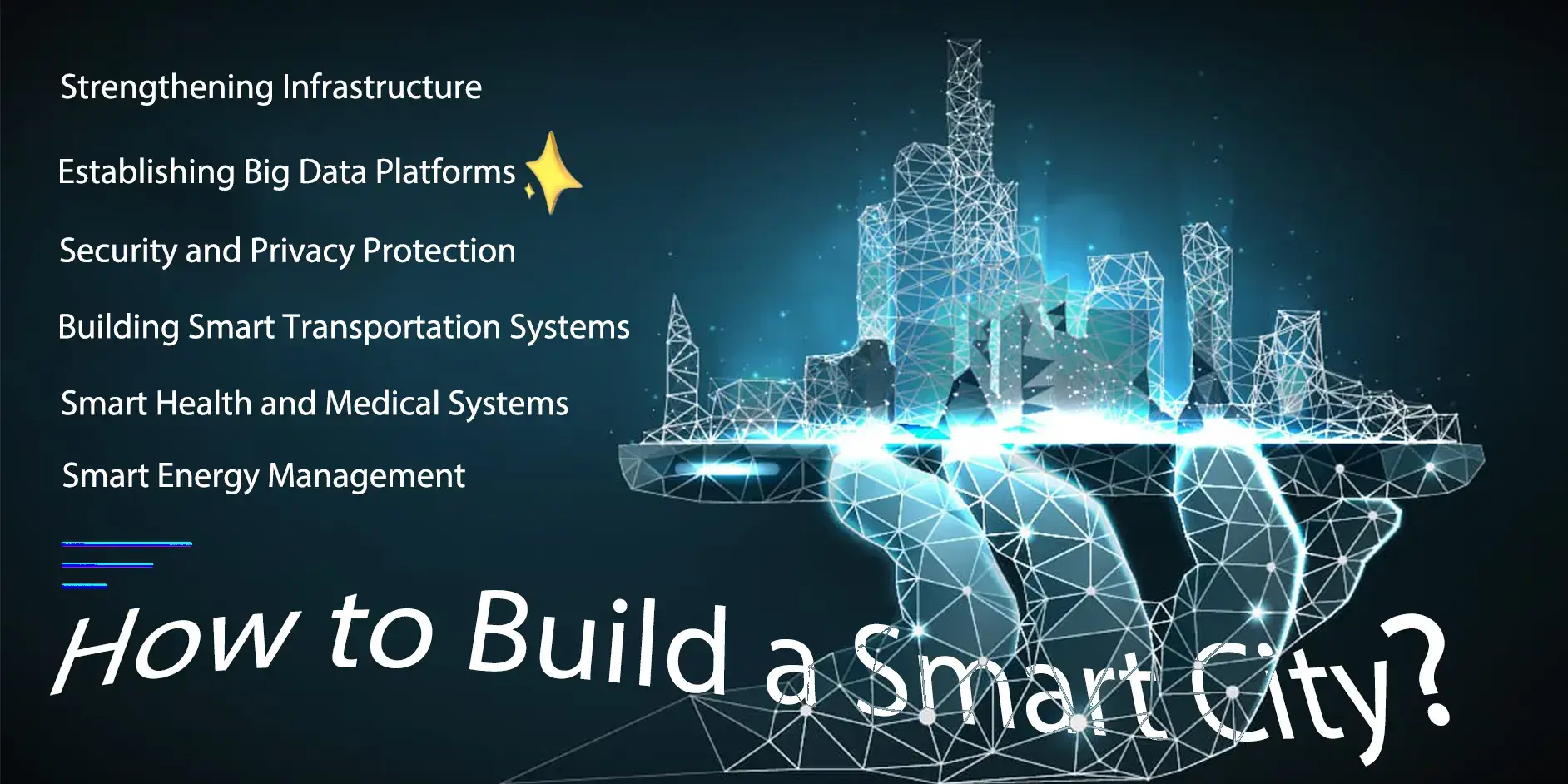
Here are the key areas involved in smart city construction:
3.1 Strengthening Infrastructure – The Foundation
Infrastructure is the backbone of any smart city. Integrating advanced technologies (e.g., communications networks, IoT, and smart grids) into infrastructure helps cities operate more efficiently. Key measures include:
- Communication Networks: Build high-speed, wide-coverage 4G/5G networks to support large-scale device connectivity and efficient data transmission.
- Internet of Things: Deploy sensors and smart devices to create a real-time monitoring and feedback system for city operations.
- Smart Grids: Optimize energy supply and management to enhance energy efficiency through smart grid technologies.
3.2 Establishing Big Data Platforms – The Core
Big data platforms are the heart of a smart city, supporting decision-making, service delivery, and city management through the collection, storage, analysis, and sharing of urban data.
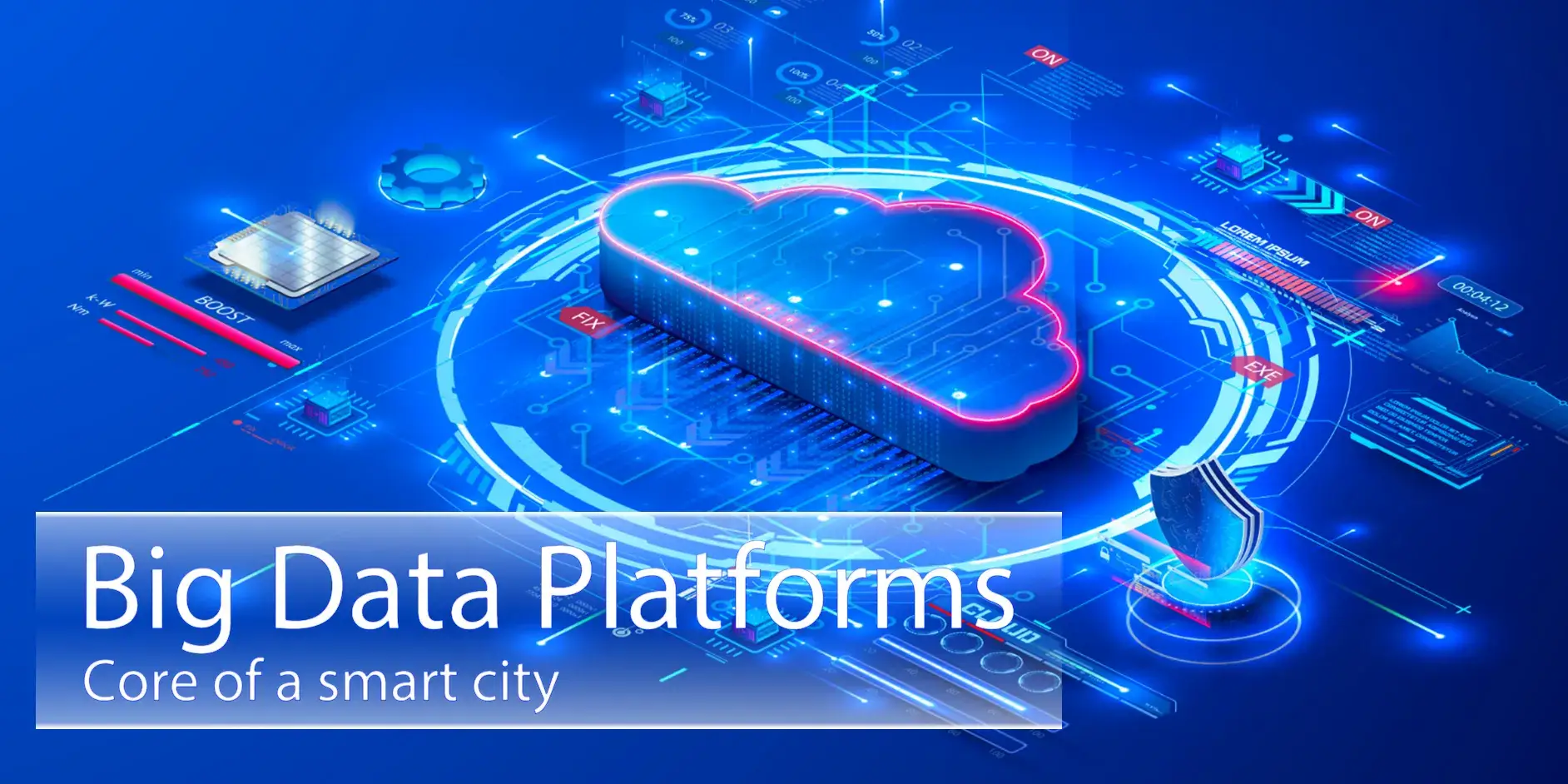
Key benefits include:
- Data Integration and Sharing: Consolidate data from multiple sectors into a single platform, ensuring efficient use and sharing of information.
- Smart Decision Support: Use data-driven insights to guide government and business decisions, making urban management more effective.
- Real-time Monitoring and Feedback: Real-time data analysis helps identify problems quickly and propose solutions.
3.3 Security and Privacy Protection – Crucial Guarantees
Given the vast amounts of data collected in smart cities, securing this information and protecting privacy is critical. If information security and privacy are not properly safeguarded, the construction of big data platforms will face significant resistance, and the development of smart cities will be difficult to achieve. The following measures can be taken to ensure information security:
- Data Security: Employ encryption, authentication, and other security measures to safeguard user privacy and data integrity.
- Network Security: Implement robust cybersecurity protocols to prevent data breaches and cyberattacks.
- Privacy Protection Policies: Enforce strict data privacy regulations to ensure residents’ personal information is protected.
3.4 Building Smart Transportation Systems – Essential Component
Intelligent transportation systems are an essential component of ecosmart city construction. They improve traffic management and optimize traffic flow through technological means. The following measures can be taken:
- Intelligent Traffic Light Control: Adjust traffic signals in real time, automatically optimizing the red-green light cycle based on traffic flow to alleviate congestion.
- Traffic Monitoring and Analysis: Use sensors and monitoring systems to collect traffic flow data in real time and dynamically adjust traffic control strategies.
- Shared Mobility: Support innovative mobility modes such as shared bicycles, shared cars, and autonomous vehicles to reduce private car usage and ease urban traffic pressure.
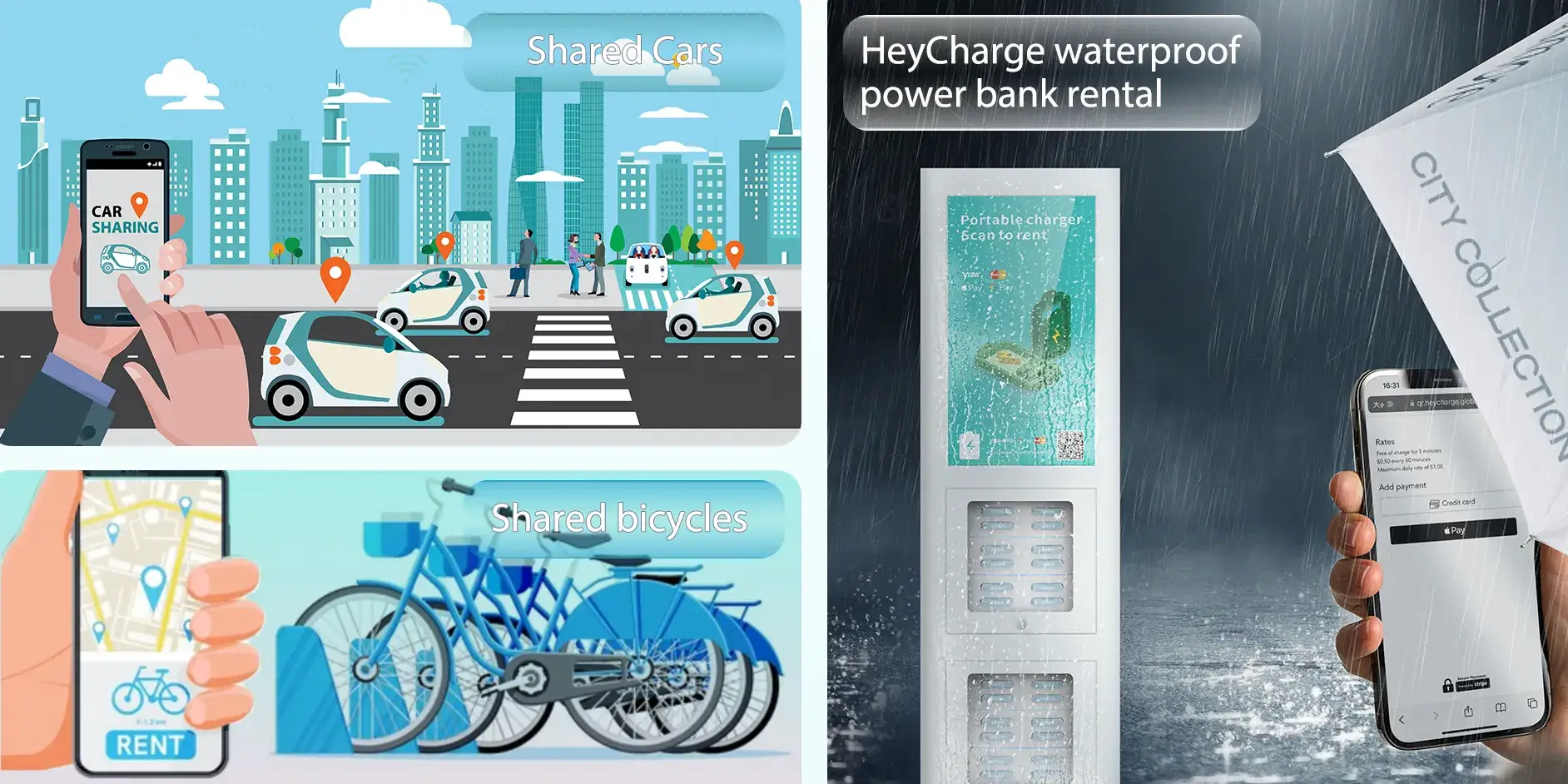
By the way, the sharing economy is a profitable business model, and businesses like shared bicycles, shared cars, and power bank rental have seen success in many countries and regions.
If you are interested in learning about the shared power bank business, you can click the “Inquire Now” button below to contact HeyCharge, a shared power bank provider with 7 years of industry experience. We will help you quickly understand this industry.
3.5 Smart Health and Medical Systems – Essential Component
Smart health and medical systems help improve public health management efficiency and ensure that citizens can easily access healthcare services. These systems are an important component of smart city building. The following measures can be taken:
- Telemedicine: Use digital technologies to provide online medical consultations and health management services, especially for residents in remote areas.
- Intelligent Health Monitoring: Use wearable devices and smart home equipment to monitor health data, prevent diseases, and provide personalized health management plans.
- Electronic Health Records: Build comprehensive electronic health records to facilitate the sharing of health information between doctors and patients, improving treatment efficiency.
3.6 Smart Energy Management – Essential Component
Smart energy management systems help improve energy efficiency, reduce waste, and promote sustainable development. The following measures can be taken:
- Smart Grids: Optimize electricity usage and distribution through real-time monitoring and intelligent scheduling.
- Green Energy: Promote the use of renewable energy sources like solar and wind power, and manage them with smart technologies.
- Energy Storage and Management: Develop efficient energy storage technologies to ensure the stability and flexibility of energy supply.
3.7 Intelligent Environmental Monitoring – Key Component
Intelligent environmental monitoring systems can monitor air quality, water quality, and other environmental factors in real time, allowing for timely responses to pollution problems. This helps detect and mitigate environmental issues promptly.

The following measures can be taken:
- Air Quality Monitoring: Use sensors to detect pollutants like PM2.5, PM10, and carbon dioxide in real time, and implement pollution control measures.
- Water Resource Management: Use smart water meters and monitoring systems to detect water usage, optimize distribution, and maintain pipelines.
- Waste Management: Use smart trash bins and automatic sorting systems to improve recycling rates and reduce the environmental impact of waste.
3.8 Digital Governance and Citizen Participation – Accelerator
Digital governance improves government management efficiency through information technology, while citizen participation enhances democracy and transparency. The more people participate, the faster the building of smart cities will progress. The following measures can be implemented:
- E-Government: Provide convenient online government services to simplify administrative processes and enhance government transparency.
- Citizen Feedback Mechanism: Use social media, mobile apps, and other channels to collect citizen feedback, increasing their sense of involvement in urban governance.
- Smart Decision Support: Use data analysis to support decisions on urban planning, traffic management, and other areas, enhancing governance effectiveness.
3.9 Public Services and Social Inclusivity – Accelerator
The development of smart cities should ensure that all citizens, especially vulnerable groups, have equal access to public services and intelligent welfare. When everyone can benefit from the advantages of an intelligent city, they will naturally participate more actively and provide greater support, accelerating the progress of smart city building.
The following initiatives can be implemented to ensure social inclusivity:
- Digital Inclusive Services: Provide digital devices and training to help vulnerable groups master smart technologies and avoid the digital divide, ensuring that everyone can enjoy the convenience brought by modern technology.
- Smart Social Security: Use digital technologies to enhance the inclusiveness of social security, welfare, and public services, ensuring that all citizens benefit equally from government-provided social protection and services.
- Aging Society Services: Offer smart elderly care services for the aging population, including health monitoring, smart home support, and other innovative technologies, to create a more convenient and safe living environment for seniors, improving their quality of life and independence.
Part 4: How Shared Power Banks Boost Smart City BuildingHOT
Power bank vending machines play an integral role in the development of future cities, offering convenient mobile charging solutions in public places, commercial areas, transportation hubs, and more. Their development aligns with multiple smart city initiatives, including enhancing public services and promoting the sharing economy.
- Enhancing Resident Experience: Providing citizens with convenient and fast charging services, particularly solving the issue of insufficient battery power when out and about.
- Promoting Green Energy: Many rental power bank devices use renewable energy or efficient charging technologies, in line with sustainable development requirements.
- Enhancing Urban Intelligence: power bank sharing services are part of smart sustainable cities, reflecting the deep integration of information technology with everyday life scenarios.
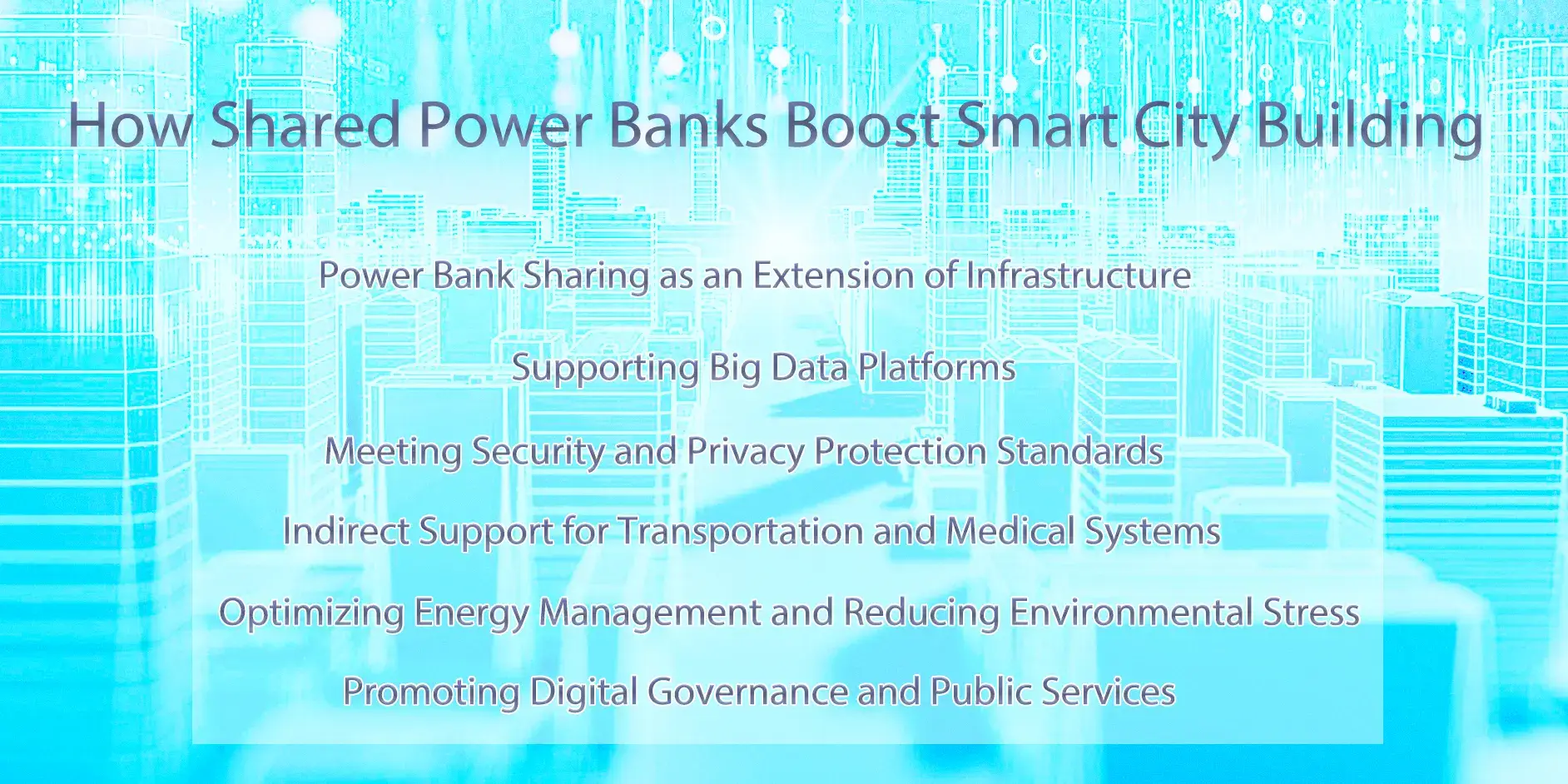
Power bank vending machines are a significant boost to the development of smart cities of the future because they are integrated into multiple aspects of urban construction. For example:
4.1 Power Bank Sharing as an Extension of Infrastructure
The deployment of shared power banks in cities is an extension of urban infrastructure construction because they serve the public, much like traditional infrastructure such as water supply, electricity, and roads.
The difference is that while water supply, electricity, and roads serve everyone, shared power bank services have a more limited coverage area. Water supply, electricity, and roads provide services that are more public-oriented, whereas shared power banks provide profit-driven services.
4.2 Supporting Big Data Platforms
Building a big data platform relies on data collection. Once power bank stations are deployed in various parts of the city, the shared power bank software system will automatically collect user information. This user data provides a reliable and accurate data source for the big data platform, thereby reducing the difficulty of data collection.
4.3 Meeting Security and Privacy Protection Standards
Shared power bank companies must adhere to strict security and privacy regulations to build trust with users and avoid legal complications. By ensuring compliance with security laws, shared power banks help maintain user confidence and support a smooth business operation.
4.4 Indirect Support for Transportation and Medical Systems
With the development of mobile internet, activities like hailing a taxi, scanning a code to board a vehicle, making medical appointments, and paying fees are all closely tied to mobile phones. If your phone runs out of battery at critical moments—when you need to hail a ride, visit a doctor, or make a payment, it can cause significant inconvenience during travel and healthcare.
By placing power bank stations near transportation hubs and within hospitals, these kinds of troubles can be greatly reduced, helping the transportation and medical systems function smoothly.
Moreover, transportation hubs and hospitals are areas with high foot traffic and significant charging demand. Deploying power bank rental stations in these locations can generate more rental income. In other words, power bank charging stations and transportation and healthcare systems are mutually beneficial.
Still looking for a way to make money? The power bank sharing business is quite profitable actually. Why not consider starting a shared power bank business? Click the “Inquire Now” button below to learn more~
4.5 Optimizing Energy Management and Reducing Environmental Stress
Shared power banks contribute to energy optimization and environment protection by reducing the number of unused or disposed batteries, maximizing resource use and minimizing waste. This aligns with smart city goals of sustainable energy management and environmental monitoring.
4.6 Promoting Digital Governance and Public Services
Shared power banks encourage the adoption of cashless payment systems, advancing digital governance. By offering charging services at public transportation hubs and other key locations, they improve citizens’ experience and enhance public service efficiency.
That is to say, developing the power bank rental business can seamlessly integrate into multiple aspects of smart city building, making it a great project to promote the development of smart cities. If the government has plans to build a smart city, it is highly likely that they will support the growth of the shared power bank industry.
With government support, the power bank sharing business will face significantly fewer challenges, and there will be greater potential for rapid growth. Moreover, it will be easier to make money in this sector. It’s worth giving it a try!
Conclusion
In conclusion, building a smart city is a long-term, systematic process involving collaboration across various sectors. Through efforts in infrastructure, big data platforms, security, public services, and more, smart cities can achieve efficient resource utilization, intelligent governance, and improved residents’ quality of life.
Rental power banks are an important enabler of smart city development, perfectly aligning with multiple smart city goals. They are likely to receive government support (policy or finance), which can ease the challenges of business expansion and increase profitability. If you’re considering entering the shared power bank market, now is a great time to explore this opportunity. Click the following “Inquire Now” button, contact us and get more details now~



